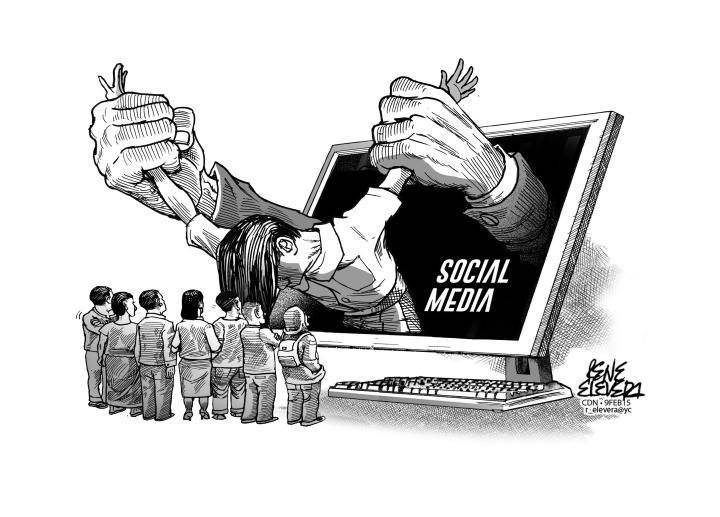During the 04.04.2019 government session of the supreme body of the executive branch [1], Prime Minister of the Republic of Armenia Nikol Pashinyan said: “We had talked about it several times. Yes, freedom of speech and information in our country is guaranteed.But if some criminal circles spend millions on social networks, in the media to manipulate public opinion, this is a matter of national security.And I hope that your service will be able to provide concrete results on this issue.In social networks, there are fakes acting under so-called revolutionary flags, which appeal to violence, including against former government officials [2]. “
According to Article 42 of the Constitution of the Republic of Armenia, “Everyone has the right to freedom of expression. This right includes the freedom to hold opinions, as well as the freedom to seek, receive and distribute information and ideas without the interference of state and local self-governing bodies and independent state frontiers. […]Freedom of expression may be restricted solely by law for the protection of national security, public order, health and morals or the honour and reputation of others and of other fundamental rights and freedoms.”
According to Article 6 of the Constitution of the Republic of Armenia, “State and local self-governing bodies and officials are eligible to perform only those activities for which they are authorized by the Constitution or the laws.”
The principle of freedom of expression is fixed not only by the Act of the Armenian Hierarchy, but also by Article 10 of the European Convention on Human Rights.
True, Prime Minister Pashinyan says in his preamble that freedom of speech and information in Armenia is guaranteed, but did not present any further guarantee.On the contrary, the manipulation agenda is put forward, without precisely defining what manipulation is and for what the responsibility will fall. In this case, the definition of the term “manipulation” does not contain a very positive requirement, because, without clarifying the boundaries of the phenomenon, it may be possible for responsibility to undertake, which is a violation of the principles of legality and legal certainty, as they carry out their activities with state bodies that have no authority and the law (as well as its absence) ceases to be predictable.
Also problematic is the fact that the constitutional right to freedom of expression, in fact, probably will be limited without appropriate normative legal act, law-making [3], which is simply a constitutional requirement.
The prime minister instructed the National Security Service to monitor and supervise the new “problem”.According to Article 6 of the RA Law on “National Security Bodies”, “The activities of national security bodies are based on legality, democracy, equality before the law, respect and protection of human and civil rights and freedom, independence from political parties and non-governmental organizations, on the principles of the combination of explicit and confidential methods and means of its activities not prohibited by the legislation of the Republic of Armenia.”That is to say, even the transfer of the problematic process to the oversight of the National Security Service does not mean that the latter will have the right to take any step.
According to Article 9 of the same law, “The activities of national security bodies are implemented in the following main directions:
- a) reconnaissance activities;
- b) counter-reconnaissance activities;
- c) military counter-reconnaissance activities;
- d) protection of the state border;
- e) fight against crimes.”
Controlling the views expressed by individuals in social media does not fit within the scope of the security sector, and the public sector, as cited in the constitutional article, is restricted by the powers vested in them by the law.NSS Director Arthur Vanetsyan did not specify what manipulation meant, saying that he would not enter into a game with words, but said he would be very attentive and cautious.[4] We believe that the promise of caution and care is not yet a sufficient guarantee for the protection of the rights and freedoms of individuals.In other words, it is possible that a criminal offence is qualified as manipulative and receives responsibility, even though neither manipulation nor responsibility is defined concepts.
In its numerous decisions, the European Court of Human Rights, emphasizing the importance of freedom of expression, also noted that even if the expressed mentality is an evaluative judgment, it is still insufficient to intervene.[5] Moreover, the Court notes that not only the positive content is subject for protection, but also those that may be qualified as offensive, shocking, disturbing, characterizing all these as manifestations of tolerance, broad-mindedness, displays of pluralism, without which it is impossible to imagine a democratic society.[6]
After the widespread use of the Internet, the European Court of Human Rights also referred to the freedom of expression in the online domain with several cases, noting that in modern conditions, the Internet is an important source of getting information.[7]
In the case of freedom of expression, it is important to have a balance between the public and private interests.In this case, the situation is explosive and can lead to criminalization and prosecution of opinions expressed against censorship or the authorities.Such behaviour is illegal.Even if after some legislative adjustments the behaviour becomes legal, it will continue to be illegalall the same.[8]
[1] ՀՀ Սահմանադրություն, հոդված 146: [2]http://www.panarmenian.net/arm/news/267232/?fbclid=IwAR3WA1d2ovZAKhvTIo8jvGbHju6GM9FLCISMSTlyN5Tvolh5T6oEJX2Fmrg ,https://www.azatutyun.am/a/29861696.html [3]ԿառավարությաննիտիժամանակՎարչապետիհայտարարությունըդեռևսօրենքչէ: [4]https://www.youtube.com/watch?v=Vf6xclXtuy8 , 35-րդ րոպեից [5] Jerusalem v. Austria, 2001; Dichand and Others v. Austria, 2002 [6]Handyside v. the United Kingdom, 1976; Sunday Times v. the United Kingdom, 1979; Lingens v. Austria, 1986; Oberschlick v. Austria, 1991; ThorgeirThorgeirson 1999; Arslan v. Turkey, 1999; Thoma v. Luxembourg, 2001; Jerusalem v. Austria, 2001; Maronek v. Slovakia, 2001; Dichand and Others v. Austria, 2002. [7]Delfi AS v. Estonia [GC], § 133 [8]Շարադրյալում չեն քննարկվում ՀՀ քրեական օրենսգրքի հանցակազմերի հատկանիշներ պարունակող արարքները:Bibliography
Author: Lusine Hovhannisyan ©All rights are reserved.
Translator: Armine Avetisyan









